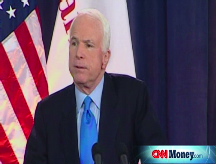3 tax breaks we love (but can't afford)
It may seem like free money from Uncle Sam, but what doesn't come out of your pocket now has to come out later.
 |
| Pat Regnier's column "The Bottom line," appears monthly in Money Magazine. Email him at pregnier@moneymail.com |
(Money Magazine) -- For some strange reason, the government keeps writing me checks. Every year Uncle Sam hands me cash to help with my family's health insurance. I also get free money as a reward for buying stocks to fund my own retirement.
Okay, I don't actually receive any checks. I'm just enjoying some of the many tax breaks aimed at the middle and upper-middle class. The insurance premiums my employer pays are 100% tax-free, a benefit I wouldn't enjoy if I had to buy coverage myself. When I save in my 401(k), I get a valuable tax deferral.
These are subsidies, the same as if the money went straight into my bank account. Although tax subsidies often support mom-and-apple-pie stuff like saving and home ownership, they don't serve the public good nearly as well as you might think.
And they aren't exactly a free gift. "It all has to be made up by higher taxes on our other income," says Leonard Burman of the nonpartisan Tax Policy Center. "Or by higher taxes on our kids because we aren't actually paying our bills."
The lost revenue also makes it tougher for the government to do other things we might wish it could, such as cover the uninsured. Let's take a closer look at three of the tax code's biggest bonuses:
If you've ever wondered how employers became responsible for most Americans' health care, here's your answer. The tax code essentially gives you a discount on insurance, as long as you buy it at work. The better your plan - and the higher your tax bracket - the bigger the benefit.
There's one huge social advantage to this setup: Company health plans pool risk, with healthier employees' premiums covering the costs of sicker folks. A downside, many economists say, is rising costs overall. With most of us paying for our health care indirectly via insurance, we have less incentive to seek out cheaper treatment options.
As every realtor will remind you, you can deduct the interest you pay on up to $1 million in mortgage debt on a first or second home. Does this promote home ownership? Doubtful. As a presidential tax reform panel noted in 2005, our 69% ownership rate is about the same as in Canada, Britain and Australia, which don't have the deduction.
Many would-be buyers enjoy no subsidy because they don't earn enough to itemize - Burman says they may even find it harder to buy insofar as the subsidy raises prices.
If anything, said the panel, the deduction may simply encourage higher-income people to take out bigger loans for bigger houses. This overinvestment in real estate might actually hurt the economy because it soaks up money that could have been put to more productive use.
Again, you can't quibble with the goal: The government should do everything it can to encourage people to prepare for retirement. Yet these programs have proved most valuable for affluent families, who likely would have saved anyway.
According to a study co-authored by Burman, about 70% of the break for 401(k)s and similar vehicles goes to the top 20% of earners. Low- and middle-income earners just aren't putting a lot into 401(k) plans.
Now I've picked on three programs that are worth a lot to most Money Magazine readers. Before you get your hackles up, rest assured that they're all pretty safe. Few politicians will touch these popular tax perks with a 10-foot pole. (Your taxes may simply be raised some other way.)
That's partly cowardice. It's also true that unwinding these things can create new problems. For example: John McCain wants to replace the current insurance subsidy with a tax credit for all, but his version could cause some people with health problems to lose coverage.
So why sweat this stuff? Because this country is facing big long-term deficits. That's led to calls to cut spending on programs like Social Security and Medicare.
But as an analysis from AARP notes, those benefits are shared much more broadly than these tax breaks. If sacrifices are needed, shouldn't it all be on the table?
How does your religion affect your finances? Money Magazine is seeking families willing to discuss the dollars-and-cents expenses involved in practicing their faith - the cost of everything from religious schools and dietary restrictions to tithing and faith-based investment limitations. If interested, please email your name, contact information and family snapshot, along with a brief summary of your salary, savings and religion-related expenses, to gmannes@moneymail.com. ![]()



